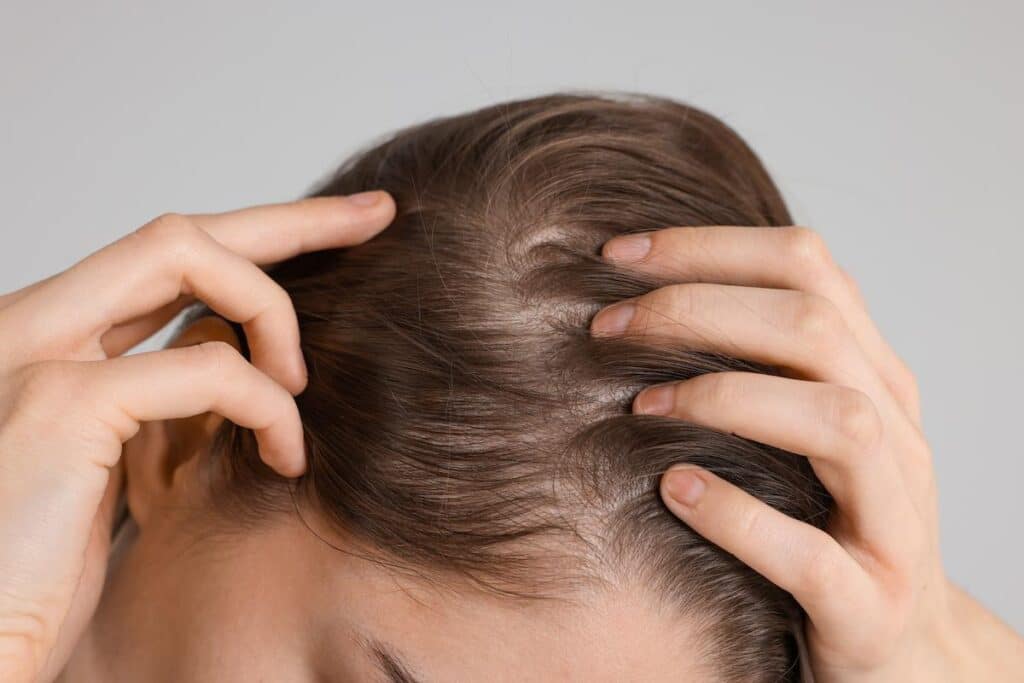Weight Loss and Hair Loss: Correlation or Causation?

Weight loss drugs are a popular tool for losing weight, even as uncertainties about the side effects and long-term efficacy continue to make headlines. One common concern people have is hair loss, as many people are seeing their hair thin or start to fall out at the same time as they take weight loss medications.
If you’re concerned about simultaneous weight loss and hair loss or future side effects, TM Hair can help you assess your risks and zero in on strategies to maximize hair regrowth. Start by learning more about whether your hair loss may be caused by or just associated with weight loss drugs.
Is Hair Loss a Side Effect of Weight Loss Medications?
So, do weight loss medications cause hair loss? The short answer is that they can—but the more complicated answer is that it may not be the medications themselves.
What the Research Says
Semaglutide, one of the active components of popular weight loss drugs like Wegovy and Ozempic, may cause hair loss, especially in women. Studies are still in progress to see the direct effects of semaglutide on how hair behaves and what may be triggering the hair loss response. In this case, weight loss and hair loss may have a direct relationship.
Understanding the Role of Physical Stress in Hair Loss
However, science shows that the physical stress of weight loss may trigger hair loss. The hair cycle is affected by stress, especially if you’re rapidly losing weight, and this can result in a condition called telogen effluvium. Hormonal changes from abrupt changes in weight can also impact the hair cycle and the overall health of your hair.
This means that if your weight loss medications are causing rapid weight loss, then that effect (not the drug itself) may be the primary cause.
Do Hair Loss Risks Vary by Type of Weight Loss Medication?
Every medication has different side effects and risks to consider. If you’re worried about simultaneous weight loss and hair loss, consider the different mechanisms behind different drugs.
GLP-1 Agonists (Semaglutide, Tirzepatide) vs. Stimulant-Based Drugs
Medications with semaglutide, generally grouped as GLP-1 agonists, can cause hair loss, both directly through rapid weight loss and directly through the semaglutide component. Stimulant-based weight loss drugs can also cause weight loss, but through a completely different mechanism: by directly changing how hair follicles behave. Stimulants can artificially force hair follicles into a resting phase and cause permanent hair loss through androgenetic alopecia. Between the two, stimulants are generally recognized to directly cause more severe hair loss.
Rapid Weight Loss Is the Greater Risk Factor
But weight loss medications also indirectly cause hair loss when they cause rapid weight loss, and this can cause more severe hair loss. When the body notices itself rapidly losing weight, it pushes hair follicles into a temporary resting phase through telogen effluvium. The hair growth cycle gets disrupted. With rapid weight loss also comes general physical stress, hormonal changes, and even less access to the nutrients hair needs to grow healthy.
Will My Hair Grow Back After Semaglutide?
Stimulant-caused hair loss may be permanent, but GLP-1 agonists are a different story.
Yes—In Most Cases, Hair Regrowth Is Likely
In most instances, you’ll see hair growth return within a few months. The hair loss is a response to the initial disruption that the medications cause. After the body stabilizes, your hormones should restabilize, and the stress will decrease.
How to Avoid Hair Loss While Taking Semaglutide
While hair generally grows back, the best strategy is to minimize hair loss in the first place. Use these strategies so you don’t have simultaneous weight loss and hair loss.
Prioritize Nutrient-Dense, Protein-Rich Meals
Appetite-suppressing medications make you eat fewer nutrients. So instead of eating less of your typical diet, switch to nutrient-rich whole foods and good sources of protein.
Supplement Wisely and Track Deficiencies
If you notice key deficiencies in your diet, talk to your doctor about vitamins and supplements. You’ll want to carefully target just the micronutrients you’re missing instead of risking complications from unnecessary supplementation.
Manage Physical and Emotional Stress
Rapid weight loss causes physical stress, but it’s not the only source of stress. Evaluate other stressors in your life—physical, mental, and emotional—and try to keep them in check.
Concerned About Hair Loss? Schedule a Consultation With TM Hair
Hair loss can be a significant and unwanted effect of weight loss, but you can manage it to continue a healthy weight loss strategy. Reach out to TM Hair today to learn more about your options for minimizing hair loss, protecting your hair, and regrowing it.
Image credit: New Africa / Shutterstock

